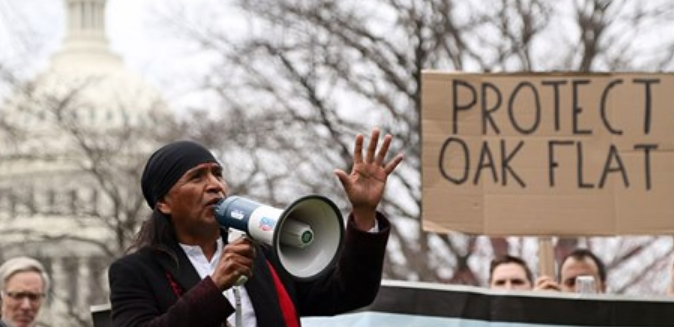
- Details
- By Darren Thompson
On Tuesday, a federal appeals court heard arguments from Apache leaders who are opposing a federal land swap they say will destroy their entire way of life.
The Apache Stronghold — a non-profit organization of San Carlos Apache Tribal citizens — filed suit on January 21, 2021 against a federally approved land deal between the U.S. Forest Service and Resolution Copper, a joint venture of mining giants Rio Tinto and BHP. The land deal, which was included in federal legislation that passed in 2014, swapped the 2,422 acres of federal land above a copper deposit for 5,459 acres of Arizona land owned by Resolution Copper.
Resolution Copper hopes to build a copper mine near a place the Apache and other tribes consider sacred, a ceremonial ground called Chí’chil Biłdagoteel, or “Oak Flat.”
Oak Flat is in the Tonto National Forest, which is the land the federal government is willing to exchange, and is on the National Register of Historic Places. It has been protected from mining by Congress for more than 60 years.
If completed, the mine would be nearly 2 miles wide and almost 1,100-feet deep. According to Resolution Copper, the mine would become the largest copper mine in North America and would supply up to a quarter of domestic copper demand per year. The company estimates it will produce as much as 40 billion pounds of copper over 40 years.
The 9th Circuit Court decided in early 2022 that Resolution Copper could proceed with operations while the lawsuit is pending in court. Last November, the court announced that it would rehear Apache Stronghold v. United States “en banc”—meaning in front of a full panel of 11 judges. The en banc hearing was requested by the court, to rehear the case, and is extremely rare, Apache Stronghold’s legal counsel Becket Law told Native News Online last fall. A call to rehear a case happens in less than 0.5 percent of cases the court hears.
In the lawsuit, the Apache Stronghold states,“the Apaches view Oak Flat as a ‘direct corridor’ to the Creator's spirit.” They also argued that the land exchange violates their First Amendment rights and the Religious Freedom Restoration Act, where “government should not substantially burden religious exercise without compelling justification.”
At Tuesday’s hearing, the court’s 11 judges questioned both sides about whether the government can do what it wants with federal land, even if it prevents some citizens from fully exercising their religious rights.
"Oak Flat is where my people have come to connect with our Creator for millennia, and we have the right to continue that sacred tradition,” Apache Stronghold Executive Director Wendsler Nosie Sr. said in a statement after the hearing. "Today we stood up in court for that right, determined to stop those who think that our place of worship can be treated differently simply because it lacks four walls and a steeple.”
The hearing in Pasadena brought Apache Stronghold with elders and allies from other Tribes to a ceremony outside the courthouse. Peter Roybal, executive counsel for Chiricahua Apache Nation, lives in Pasadena and traveled to Arizona to transport elders to attend the ceremony.
“We are here to support Oak Flat and the Apache Stronghold,” Roybal, told Native News Online. “We pray the panel of judges have strength, wisdom and good judgment. This is a decades old battle and it has been fought on many fronts, but regardless of today’s outcome, we have seen many people come together with kindness and support.”
The 9th U.S. Circuit Court of Appeals is expected to issue a decision in the next few months.
More Stories Like This
50 Years of Self-Determination: How a Landmark Act Empowered Tribal Sovereignty and Transformed Federal-Tribal RelationsNCAI, NARF Host Session on Proposed Limits to Federal Water Protections
“Our Sovereignty Is Not Optional”: Tulalip Responds to ICE Actions
Denied Trip to Alcatraz, Leonard Peltier Tells Sunrise Gathering: “My Heart Is Full”
‘Meet your prayer halfway’ | Women-Led Bison Harvests Bring Tribal Food Sovereignty
Help us defend tribal sovereignty.
At Native News Online, our mission is rooted in telling the stories that strengthen sovereignty and uplift Indigenous voices — not just at year’s end, but every single day.
Because of your generosity last year, we were able to keep our reporters on the ground in tribal communities, at national gatherings and in the halls of Congress — covering the issues that matter most to Indian Country: sovereignty, culture, education, health and economic opportunity.
That support sustained us through a tough year in 2025. Now, as we look to the year ahead, we need your help right now to ensure warrior journalism remains strong — reporting that defends tribal sovereignty, amplifies Native truth, and holds power accountable.
 The stakes couldn't be higher. Your support keeps Native voices heard, Native stories told and Native sovereignty defended.
The stakes couldn't be higher. Your support keeps Native voices heard, Native stories told and Native sovereignty defended.
Stand with Warrior Journalism today.
Levi Rickert (Potawatomi), Editor & Publisher

